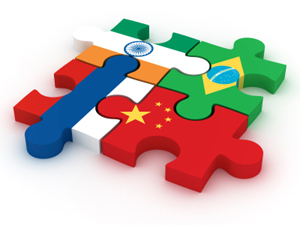DURBAN: The coastal touristy city of Durban is decked up in the flags and colours of BRICS countries to greet the leaders of five emerging economies, who are hoping to rewrite the rules of global governance and provide a beacon of growth amid gloom and doom of the eurozone recession.
For South Africa, the 5th BRICS summit is perhaps the biggest foreign policy event in the last decade and a prized opportunity to flaunt its position as the powerhouse of a rising continent and its credentials as the keeper of Africa’s interests. This is the first BRICS summit to be staged on the African soil since the BRIC grouping was born in the crucible of the global financial crisis in the Russian city of Yekaterinburg in the summer of 2009.
President Jacob Zuma, who has invested enormous political capital in leveraging the BRICS to raise his country’s global profile and to leverage the five-nation grouping to promote the African resurgence, has struck an upbeat note about the prospects of the two-day summit that begins March 26.
Zuma has his critics who feel the BRICS summitry is pointless showmanship which South Africa can hardly afford given the gravitas of serious economic and social problems plaguing the country, but this skepticism has not deterred Zuma from launching a BRICS charm offensive.
“Brics is not a talk show. It is a serious grouping,” Zuma told reporters March 25 at the presidential guesthouse in Pretoria. “I’ve just identified here that ever since the Brics grouping has been established, intra-Brics trade has grown. But also bilateral trade has grown. That indicates (it is) not a talk show,” the president said.
“We are able to discuss things and take decisions. If, for example, we talk about the eminent establishment of a development bank, we discussed this a while ago and immediately charged our finance ministers to work on a modality. We are now ready to launch it,” he said.
The summit’s showpiece will be the establishment of BRICS Development Bank, which is envisaged as a catalyst in infrastructure-building in Africa and in the global south. The Bank will also be a symbolic step and a potential game-changer in the BRICS larger strategic project of reforming the West-dominated global financial governance institutions to accommodate surging aspirations of the developing world. The leaders of BRICS countries will also be pushing for higher quota for developing countries in Bretton Woods institutions like World Bank and the IMF and the reform of the UN Security Council.
The leaders are also expected to unveil new steps to scale up intra-BRICS trade to $500 billion by 2015 so that the emerging world remains a hive of economic vibrancy in times of the slowdown.
India sees the $14 trillion grouping as an important factor in global recovery and is expected to push for greater market access and other economic-related pacts that lead to greater intra-BRICS investment. Ahead of the summit, Manmohan Singh set the tone. “We will discuss ways to revive global growth and ensure macroeconomic stability as well as mechanisms and measures to promote investment in infrastructure and sustainable development.”
“India will also urge faster movement on reform of institutions of global political and economic governance. It is important that BRICS continue to consult closely on developments affecting global peace and security,” he said.
The Durban summit is by far the biggest BRICS summit in term of the scale of participation. Besides the leaders of Brazil, Russia, India, China and South Africa, several leaders of African countries are also expected to be present in Durban.
Around 125 delegates from China, 125 from Russia, 74 from India, 60 from Brazil, and 242 from South Africa will be participating in the discussions at the summit.
The colours and regalia of the summitry envelop your senses the moment you touch down at the King Shaka International Airport. Around 3,000 security personnel have been deployed around the city to ensure that the summit goes without a hitch. But for a change, elaborate security arrangements have not messed up lives of Durbanites who take their pleasures seriously and would not like high-wire diplomacy to spoil their party.
Author Profile

- Manish Chand is Founder and Editor-in-Chief of India Writes Network (www.indiawrites.org) and India and World, a pioneering magazine focused on international affairs. He is CEO, Centre for Global India Insights, an India-based think tank focused on global affairs.
Latest entries
 India and the WorldFebruary 27, 2026Modi visit: India-Israel partnership enters a new era
India and the WorldFebruary 27, 2026Modi visit: India-Israel partnership enters a new era India and the WorldFebruary 24, 2026Unravelling Modi’s Israel journey: What to expect
India and the WorldFebruary 24, 2026Unravelling Modi’s Israel journey: What to expect India and the WorldFebruary 17, 2026South-by-South: Focus on people-centric solutions at India AI summit
India and the WorldFebruary 17, 2026South-by-South: Focus on people-centric solutions at India AI summit India and the WorldFebruary 7, 2026Modi hails interim India-US trade deal, Goyal says no concessions made on agriculture
India and the WorldFebruary 7, 2026Modi hails interim India-US trade deal, Goyal says no concessions made on agriculture







